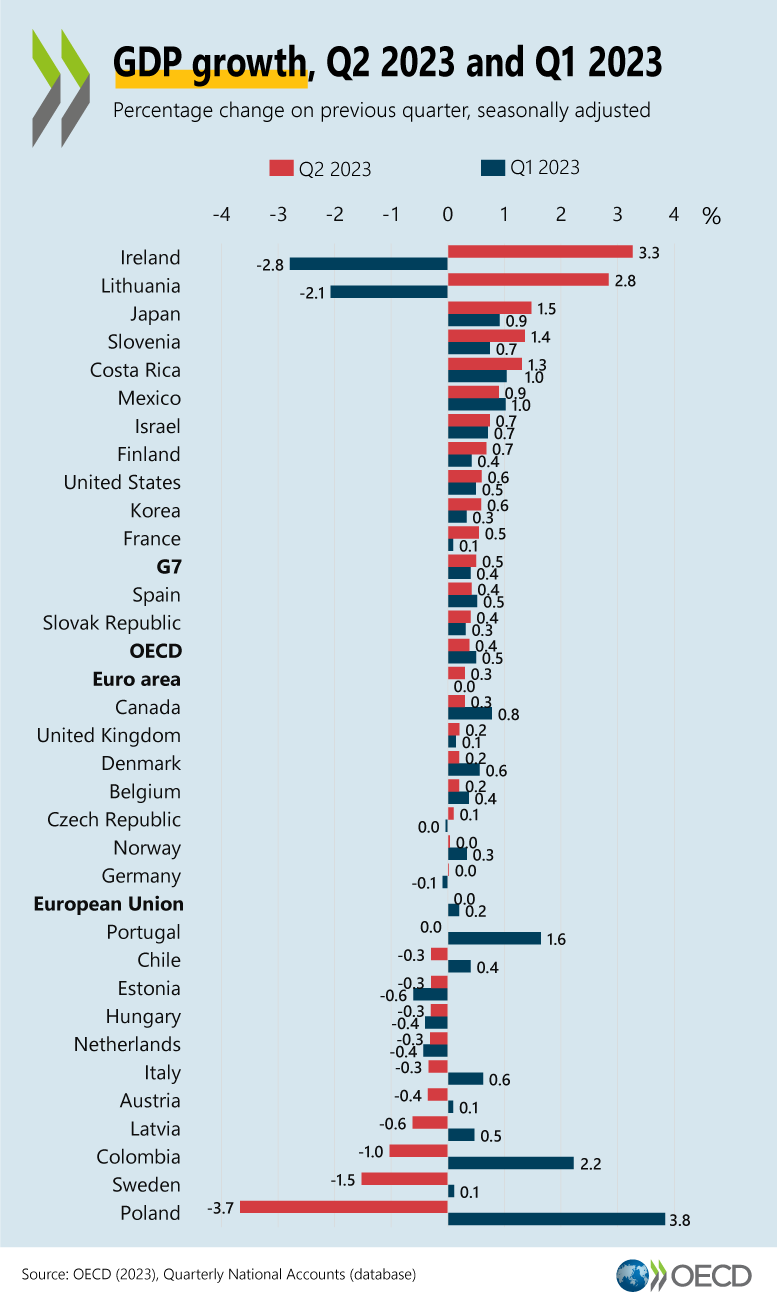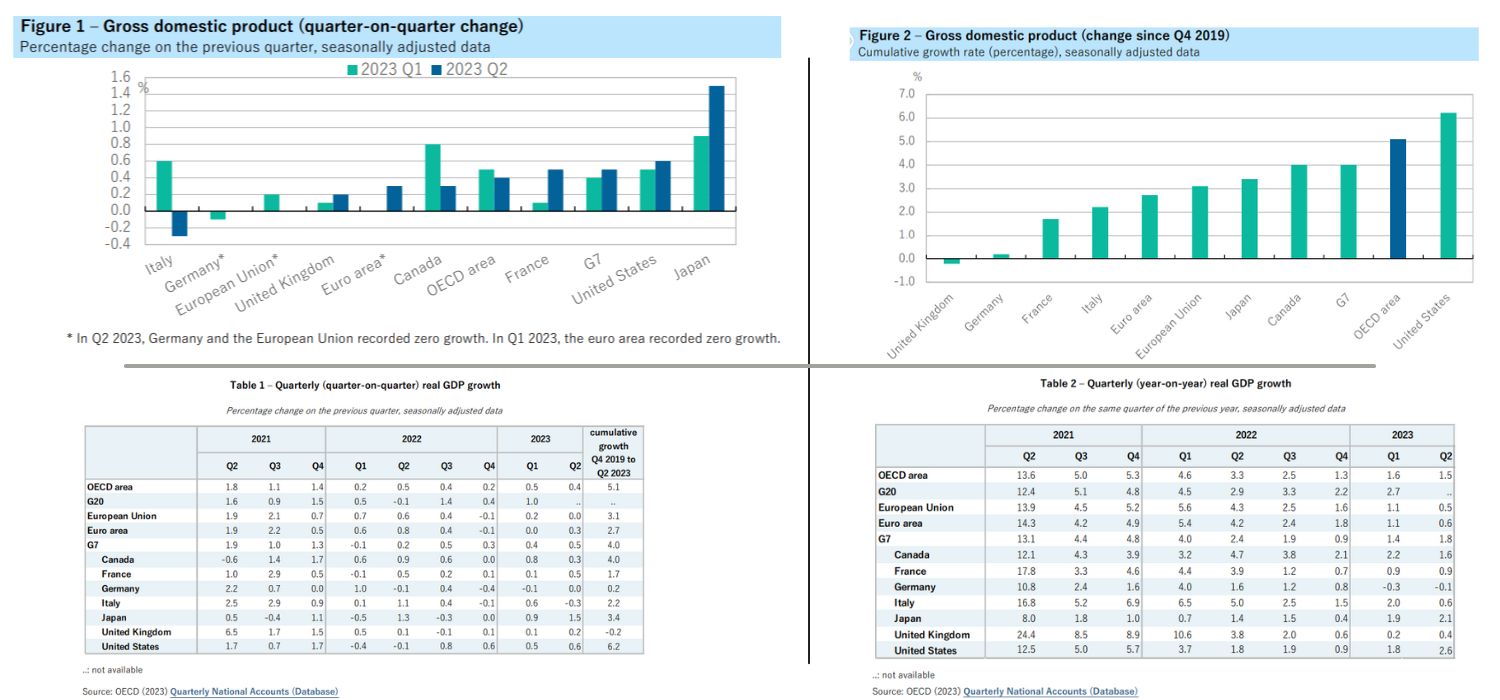‘Moderate growth’ in Q2 2023 for OECD by 0.4%, and for G7 by 0.5%: Report

According to a report published by the Organisation for Economic Co-operation and Development (OECD), GDP in the OECD rose by 0.4% in Q2 2023, which is slightly down from Q1 2023.
The report highlighted a ‘consistent pattern of moderate growth’ since Q1 2022 compared to the previous quarter, i.e., Q1 2023, which was recorded at 0.5%.

Quarter-on-Quarter GDP growth in G7 nations
Furthermore, quarter-on-quarter growth in the G7 countries (Canada, France, Germany, Italy, Japan, the United Kingdom, and the United States, as well as the European Union) improved slightly by 0.5% in Q2 2023, up from 0.4% in Q1 2023.
- Within the G7, Japan experienced the highest gain in GDP growth, notably increasing to 1.5% in Q2 2023, compared to 0.9% in Q1 2023.
- In contrast, France's GDP growth for the current quarter was recorded at 0.5%, up from 0.1% in Q1 2023.
- Similarly, the GDP growth of the US showed an increase from 0.5% in Q1 to 0.6% in Q2 2023, and the UK increased from 0.1% in Q1 to 0.2% in Q2 2023.
- However, Italy's GDP shrunk in Q2 2023 by -0.3%, compared to around 0.6% in the previous quarter.
- Growth also slowed in Canada (0.3% in Q2, compared to 0.8% in Q1). Growth was stagnant in Germany in Q2 after contracting in the previous two quarters (Figure 1).
Factors affecting GDP growth within G7 nations
The contributing factors identified for improving GDP growth within the G7 countries are as follows:
- Japan - Net exports played a key role in driving their GDP growth, with a 3.2% increase in exports and a 4.3% drop in imports. However, private consumption contracted in Q2 (by -0.5%).
- France - Net exports supported GDP growth, while private consumption contracted (by -0.3%).
- The UK - Growth was supported by an increase in private and government spending, while net exports remained a dampening factor.
- Germany - Similar to the UK, growth was supported by a drop of 1.1% in net exports.
- The US - Investments and private consumption drove GDP growth; however, private consumption growth decelerated significantly from 1.0% in Q1 to 0.4% in the current quarter.
- Italy - Preliminary analysis suggests that GDP contraction reflected a reduction in domestic demand, including changes in inventories.
Quarter-on-Quarter GDP Growth in OECD nations
The OECD nations also showed mixed GDP growth in Q2 2023. Among the OECD countries geographically close to the conflict in Ukraine, Lithuania experienced a recovery in GDP growth, achieving a rate of 2.8% in Q2 2023, up from 2.1% in the previous quarter. In contrast, Poland's GDP contracted sharply by -3.7% in Q2 2023, following growth of 3.8% in the previous quarter. Similarly, Hungary's GDP contracted by -0.3% for the fourth consecutive quarter.
On the other hand, certain OECD nations, such as Ireland, experienced robust GDP growth of 3.3% in Q2 2023. Additionally, Slovenia and Costa Rica demonstrated growth rates of 1.4% and 1.3%, respectively. Nevertheless, nearly 10 OECD nations, including Poland at -3.7%, Sweden at -1.5%, and Colombia at 1.0%, exhibited varying economic growth.
Overall, GDP growth within OECD nations exceeded their pre-pandemic level (Q4 2019) by recording growth of 5.1% in Q2 2023. Among the G7 nations, GDP also surpassed its pre-pandemic level by 4.0% in the second quarter of the current financial year. However, GDP in the UK remained slightly below its pre-pandemic level, while Spain, the OECD nation heavily affected by the COVID pandemic, exceeded its pre-pandemic GDP level for the first time, with an increase of 0.4% in the second quarter of 2023."

















